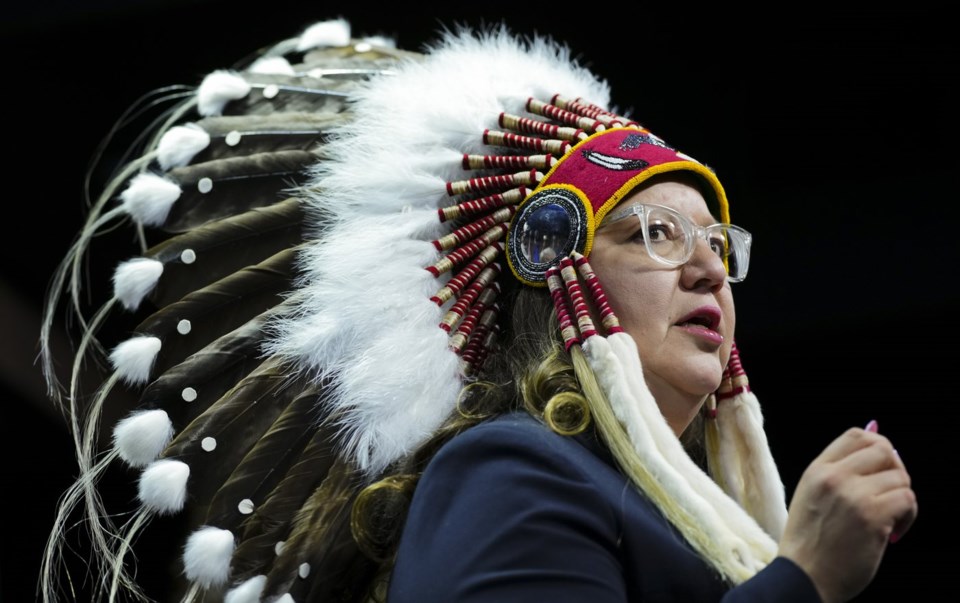OTTAWA — The national chief of the Assembly of First Nations says she doesn't blame First Nations leaders who are voicing frustration with governments promising to fast-track development in their territories in the name of national unity.
"I don't blame them. They're frustrated and they're being disrespected," National Chief Cindy Woodhouse Nepinak said Wednesday morning.
"If we're not at the table making these decisions right off the bat, this is what happens and it causes the Canadian government more problems later."
In the throne speech delivered Tuesday in Ottawa by King Charles, the federal government vowed to eliminate all federal barriers to internal trade and labour mobility by Canada Day.
It also promised to reconfigure approval processes for infrastructure projects to fast-track projects of "national significance."
The day before that speech was read, some chiefs — alarmed by Bill 5, legislation introduced in Ontario that the chiefs say would gut protections for threatened species to speed up development — cited the legacy of the Indigenous rights protest movement Idle No More.
The Idle No More protest movement took hold under former prime minister Stephen Harper's government as it looked to ramp up resource development.
It was sparked by the introduction of the omnibus Bill C-45, also known as the Jobs and Growth Act.
Indigenous leaders said the bill would diminish their rights while giving governments and businesses more authority to develop resources without thorough environmental assessments.
Indigenous leaders allied with the Idle No More movement staged protests, rallies and blockades on railway lines and highways. The protest movement grew to encompass environmental and Indigenous rights more broadly and earned widespread support from Indigenous communities around the world.
In 2013, six young people walked 1,600 kilometres to Ottawa from a Cree community in Whapmagoostui, Que., in support of Idle No More. Their journey attracted hundreds of supporters along the way and was met by thousands more on Parliament Hill.
Former Attawapiskat First Nation chief Theresa Spence also staged a hunger strike near Parliament Hill to protest the government's actions, and received backing from Amnesty International.
In response to pressure from First Nations leaders, Ontario's Indigenous Affairs Minister Greg Rickford and Energy and Mines Minister Stephen Lecce said the province will amend Bill 5 to explicitly include duty-to-consult provisions.
Similar legislation proposed in British Columbia has also seen fierce opposition from First Nations leaders in recent weeks.
First Nations leaders from Alberta, Saskatchewan and Manitoba gathered on Parliament Hill Monday morning to protest being left out of the official itinerary for King Charles's visit to Ottawa — and to remind him that it's his job to inform the prime minister of the government’s treaty obligations.
“There’s billions, if not trillions of dollars taken out of our territories every year. None of it comes back to our nations,” said Grand Chief of Treaty 8 First Nations Trevor Mercredi at Monday's press conference.
“We all have issues at home, but we’re here today to fight for the most important issue of all, and that’s our treaties. It’s about time the King, the prime minister and premiers fully understand. And if it takes lawsuits for them to fully understand, that’s what we’ll do once again.”
Woodhouse Nepinak said Wednesday that First Nations across the country are united on the need to ensure their treaty and inherent rights are respected, and she expects to speak with Prime Minister Mark Carney in the days ahead.
The premiers are set to meet in Saskatchewan next week to recommend projects for the federal government to fast-track. Woodhouse Nepinak said she'll be pushing for First Nations representation at that table.
"First Nations are 1.5 million people. We're huge in this country. And I think that the country has to prioritize that," Woodhouse Nepinak said.
In a joint media release issued Wednesday, the Assembly of Manitoba Chiefs, the Federation of Sovereign Indigenous Nations, the Assembly of First Nations and the Southern Chiefs' Organization said that First Nations must have guiding roles in the new Major Federal Project Office promised by Carney.
A spokesperson for federal Crown-Indigenous Relations Minister Rebecca Alty said building Canada's economy "relies on a strong partnership" with Indigenous Peoples.
"The Crown has a legal duty to consult — a responsibility that applies equally to provinces and territories," Gregory Frame said in a statement late Wednesday.
"Getting this right is critical to accelerating projects of national interest in true partnership, to avoid delays caused by legal challenges and to advance reconciliation."
— With files from Liam Casey in Toronto
This report by The Canadian Press was first published May 28, 2025.
Alessia Passafiume, The Canadian Press



